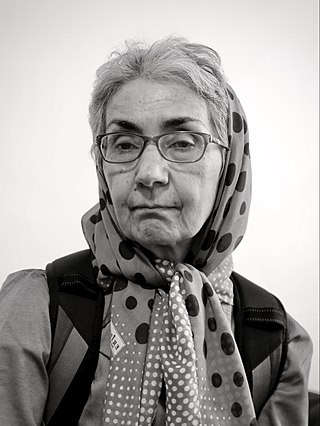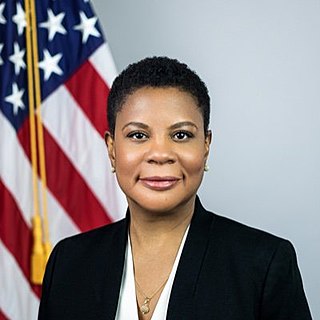Lois Wendland Banner is an American author and emeritus professor of history at the University of Southern California. She is one of the earliest academics to focus on women's history in the United States. Her work includes biographies of Margaret Mead, Ruth Benedict, Marilyn Monroe and Greta Garbo as well as the textbook Women in Modern America: A Brief History.
Feminist anthropology is a four-field approach to anthropology that seeks to transform research findings, anthropological hiring practices, and the scholarly production of knowledge, using insights from feminist theory. Simultaneously, feminist anthropology challenges essentialist feminist theories developed in Europe and America. While feminists practiced cultural anthropology since its inception, it was not until the 1970s that feminist anthropology was formally recognized as a subdiscipline of anthropology. Since then, it has developed its own subsection of the American Anthropological Association – the Association for Feminist Anthropology – and its own publication, Feminist Anthropology. Their former journal Voices is now defunct.
Saba Mahmood (1961–2018) was professor of anthropology at the University of California, Berkeley. At Berkeley, she was also affiliated with the Center for Middle Eastern Studies, Institute for South Asia Studies, and the Program in Critical Theory. Her scholarly work straddled debates in anthropology and political theory, with a focus on Muslim majority societies of the Middle East and South Asia. Mahmood made major theoretical contributions to rethinking the relationship between ethics and politics, religion and secularism, freedom and submission, and reason and embodiment. Influenced by the work of Talal Asad, she wrote on issues of gender, religious politics, secularism, and Muslim and non-Muslim relations in the Middle East.
Rada Iveković is a Croatian professor, philosopher, Indologist and writer.
Dame Ann Marilyn Strathern, DBE, FBA is a British anthropologist, who has worked largely with the Mount Hagen people of Papua New Guinea and dealt with issues in the UK of reproductive technologies. She was William Wyse Professor of Social Anthropology at the University of Cambridge from 1993 to 2008, and Mistress of Girton College, Cambridge from 1998 to 2009.
Patrick Vinton Kirch is an American archaeologist and Professor Emeritus of Integrative Biology and the Class of 1954 Professor of Anthropology at the University of California, Berkeley. He is also the former Curator of Oceanic Archaeology in the Phoebe A. Hearst Museum of Anthropology, and director of that museum from 1999 to 2002. Currently, he is professor in the department of anthropology at the University of Hawai'i Manoa, and a member of the board of directors of the Bishop Museum.

Cora Alice Du Bois was an American cultural anthropologist and a key figure in culture and personality studies and in psychological anthropology more generally. She was Samuel Zemurray Jr. and Doris Zemurray Stone-Radcliffe Professor at Radcliffe College from 1954. After retirement from Radcliffe, she was Professor-at-large at Cornell University (1971–1976) and for one term at the University of California, San Diego (1976).
Barrie Thorne is a professor of sociology and of Gender and Women's Studies at the University of California, Berkeley.

Afsaneh Najmabadi is an Iranian-born American historian, gender theorist, archivist, and educator. She is the Francis Lee Higginson Professor of History and of Studies of Women, Gender, and Sexuality at Harvard University.
Evelyn Seiko Nakano Glenn is a professor at the University of California, Berkeley. In addition to her teaching and research responsibilities, she served as founding director of the university's Center for Race and Gender (CRG), a leading U.S. academic center for the study of intersectionality among gender, race and class social groups and institutions. In June 2008, Glenn was elected president of the 15,000-member American Sociological Association. She served as president-elect during the 2008–2009 academic year, assumed her presidency at the annual ASA national convention in San Francisco in August 2009, served as president of the association during the 2009–2010 year, and continued to serve on the ASA governing council as past-president until August 2011. Her presidential address, given at the 2010 meetings in Atlanta, was entitled "Constructing Citizenship: Exclusion, Subordination, and Resistance", and was printed as the lead article in the American Sociological Review.
Ken Choy is an American writer of Chinese-Native Hawaiian ethnicity. He also is a performance artist and actor and owns and operates a shopping business in Southern California.

Michèle Lamont is a Canadian sociologist who is the Robert I. Goldman Professor of European Studies and a professor of Sociology and African American Studies at Harvard University. She is a contributor to the study of culture, inequality, racism and anti-racism, the sociology of morality, evaluation and higher education, and the study of cultural and social change. She is the recipient of the Gutenberg Award and the Erasmus award, for her "devoted contribution to social science research into the relationship between knowledge, power, and diversity." She has received honorary degrees from five countries. and been elected to the British Academy, Royal Society of Canada, Chevalier de l’Ordre des Palmes Academiques, and the Sociological Research Association. She served as president of the American Sociological Association from 2016 to 2017.

Alondra Nelson is an American academic, policy advisor, non-profit administrator, and writer. She is the Harold F. Linder chair and professor in the School of Social Science at the Institute for Advanced Study, an independent research center in Princeton, New Jersey. From 2021 to 2023, Nelson was deputy assistant to President Joe Biden and principal deputy director for science and society of the White House Office of Science and Technology Policy (OSTP), where she performed the duties of the director from February to October 2022. She was the first African American and first woman of color to lead OSTP. Prior to her role in the Biden Administration, she served for four years as president and CEO of the Social Science Research Council, an independent, nonpartisan international nonprofit organization. Nelson was previously professor of sociology at Columbia University, where she served as the inaugural Dean of Social Science, as well as director of the Institute for Research on Women and Gender. She began her academic career on the faculty of Yale University.
Renato Rosaldo is an American cultural anthropologist. He has done field research among the Ilongots of northern Luzon, Philippines, and he is the author of Ilongot Headhunting: 1883–1974: A Study in Society and History (1980) and Culture and Truth: The Remaking of Social Analysis (1989).
Carol Lowery Delaney is an American anthropologist and author. She is also an Associate Professor of Cultural and Social Anthropology, Emerita of Stanford University.
Françoise Lionnet serves as acting chair of the Committee on Degrees in Studies of Women, Gender and Sexuality at Harvard University, where she is professor of Romance languages and literatures, comparative literature, and African and African American studies. She is distinguished research professor of comparative literature and French and Francophone studies at UCLA, and a research associate of the Centre for Indian Studies in Africa at the University of Witwatersrand, Johannesburg. She served as director of the African Studies Center and Program Co-Director of UCLA's Mellon Postdoctoral Fellowship in the Humanities: Cultures in Transnational Perspective.
Leith Patricia Mullings was a Jamaican-born author, anthropologist and professor. She was president of the American Anthropological Association from 2011–2013, and was a Distinguished Professor of Anthropology at the Graduate Center of the City University of New York. Mullings was involved in organizing for progressive social justice, racial equality and economic justice as one of the founding members of the Black Radical Congress and in her role as President of the AAA. Under her leadership, the American Anthropological Association took up the issue of academic labor rights.
Jigna Desai is a Professor in the Department of Gender, Women and Sexuality Studies and Asian American Studies, currently at the University of Minnesota. She is a writer, teacher, mentor, artist, and engaged researcher whose scholarship crosses many fields of study including transnational feminism, Asian American Studies, queer studies, postcolonial feminism, critical disability studies, critical youth studies, feminist media studies, critical ethnic studies, and critical university studies. She has also written extensively on issues of racial and gender disparities and social justice.
Donald Lawrence Brenneis is an American anthropologist and professor of anthropology at the University of California, Santa Cruz. Brenneis served as president of the American Anthropological Association (2002–2003). He became co-editor of the Annual Review of Anthropology as of 2010. He has served two terms as director of the American Council of Learned Societies.
Felicity A. Nussbaum is Distinguished Research Professor of English at the University of California, Los Angeles. Her research interests include 18th-century literature and culture, critical theory, gender studies and postcolonial and Anglophone studies. In the past she taught at Syracuse University and Indiana University South Bend.



